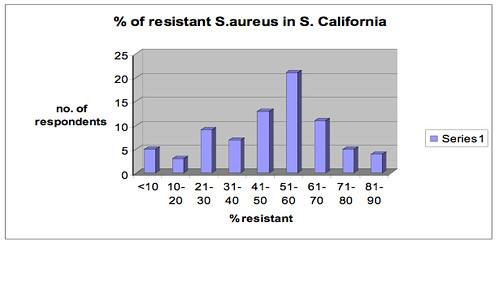Geneticists often use the phrase wild type to describe the dominant allele--genetic variant--of a gene. In microbiology, we typically assume that the wild type of a bacterium is sensitive to antibiotics, and that the rare mutants (and recombinants) are antibiotic resistant.
My colleague, Susan Foster, at the end of a seminar she presented to clinicians in Southern California, asked her audience to anonymously write down the percentage of methicillin-resistant Staphylococcus aureus (MRSA) at their hospitals.
The result?
The median percentage of methicillin resistance was 60% (the average was 55%):

(image courtesy Susan Foster, Alliance for the Prudent Use of Antibiotics)
The X-axis is the percentage of S. aureus that are MRSA; the Y-axis is the number of institutions that fall into each class (out of 80 total).
That's right: half of the hospitals had frequencies of methicillin resistant of 60% or greater. That leaves three treatment options. Vancomycin, which requires intravenous therapy, making it expensive and requiring longer hospital stays. Linezolid can be given orally; however, there can be serious side effects (and linezolid is not cheap, ~$1,000 for a course of treatment). Tigecycline can also be used, but it too isn't cheap (and it also can't be used in children).
At this point, in clinical settings at least, the phrase "methicillin resistant staph" has become redundant. The wild type is resistant. While the precise numbers vary, treating MRSA is about $20,000 more per infection than treating sensitive S. aureus. Our data from Massachusetts indicate that the majority of these infections occur in people 65 or over: we are all paying for this problem with our tax dollars.

Ominous stuff... just one small niggle:
It might be better to say "most common" rather than "dominant", since the latter term usually has quite a different definition in genetics.
I agree with Mesk -- I nail my intro bio students on this all the time.
By the way, Mike, you should close that italics tag you've got in your post.